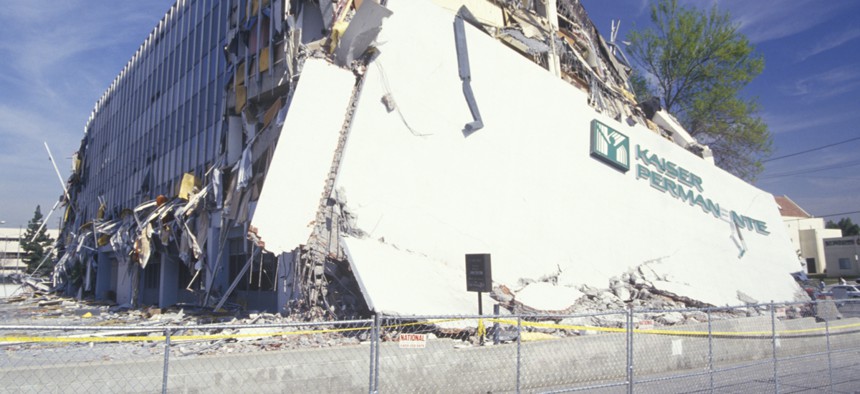California Legislation Would Mandate List of Quake-Vulnerable Buildings

A Kaiser Permanente office building in Los Angeles was damaged in the 1994 Northridge earthquake. Shutterstock
STATE AND LOCAL ROUNDUP | School districts still scrambling for bus drivers … Mich. county removes massive “fatberg” from sewer … and a Fla. city OKs a ban on lawn fertilizer.
Good morning, it’s Thursday, Sept. 13, 2018. Hurricane Florence is moving into the Carolinas—stay tuned for more from Route Fifty in the coming days. Disaster news of a different sort leads our state and local government news roundup, but scroll down for more stories from places like Lincoln, Nebraska; Venice, Florida; and Macomb County, Michigan.
STATE GOVERNMENT | State lawmakers in California have approved legislation sponsored by Assemblyman Adrin Nazarian of North Hollywood that would mandate seismically vulnerable cities and counties to “create lists of buildings that could be at higher risk of major damage or collapse” during a major earthquake. But the bill, if signed by Gov. Jerry Brown, would only go into effect if state funding is identified. Many larger jurisdictions, including Los Angeles, Santa Monica and San Francisco, have started their own seismic inventorying efforts. “If you don’t know how sick you are, or how vulnerable you are, to me, it’s a sign of ignorance,” David Khorram, the city of Long Beach’s superintendent of building and safety, told the L.A. Times. “A mandate like this will help and encourage smaller cities to accomplish what the bigger cities are doing.” [Los Angeles Times]
- Lincoln, Nebraska: A new poll released by the Holland Children's Institute shows that a majority of Nebraskans think that “state government should invest more in the middle class, raising taxes on corporations and the wealthy to do so.” [Lincoln Journal-Star]
- Austin, Texas: After Texas state legislators zeroed out funding for the Office of Minority Health Statistics and Engagement, the small operation focused on institutionalized racism shuttered on Aug. 31. [KUT]
- Jackson, Mississippi: The 14-member Mississippi Legislative Budget Committee used to hold “several days of hearings” before starting the budget-writing process. This year, it’s condensing it all into “a single day with only a few agencies.” [WJTV]
- Reno, Nevada: A “secretive” blockchain business is seeking an OK from the Nevada Public Utilities Commission to “build, operate, and maintain a new fiber optic network” at the Tahoe-Reno Industrial Center, where Tesla’s “gigafactory” is located. [The Nevada Independent]

LOCAL GOVERNMENT | With school bus driver shortages in various parts of the nation, local administrators continue to scramble to find enough qualified operators to transport students to and from school. In St. Paul, Minnesota, school administrators are trying to move 32,000 students along 350 routes with an operation that’s “5 to 20 percent short on drivers.” According to Tom Burr, who heads up the St. Paul schools’ transportation services: "It's kind of a domino effect. We're backfilling people, drivers, with typically full-time staff—mechanics, dispatchers, trainers." In Chesterfield County, Virginia, local schools have had problems retaining drivers. Between February 2017 and August 2018, Chesterfield schools hired 180 new bus drivers, but “174 drivers either resigned, retired or were terminated during the same period.” [Minnesota Public Radio; Chesterfield Observer]
- Macomb County, Michigan: Local public works officials have removed a “fatberg” from a local sewer that’s “100 feet long, 11 feet wide and nearly 6 feet tall” that was “caused by people and restaurants pouring grease and similar materials down their drains.” [Detroit Free Press]
- Venice, Florida: The Venice City Council on Tuesday voted to institute a voluntary ban on lawn fertilizers, something that’s irked lawn care businesses but praised by some local fishermen. “Just like anything in politics, it takes time. The fact that there is discussion and that it's ongoing is positive,” according to fisherman Rob Merlino. [WFTS]
- Tucson, Arizona: Local officials are suing 3M, the manufacturer of chemicals used in firefighting foam that's turned up in some local wells. [KVOA]
- Denver, Colorado: Civic Center Park, the great public space between the Colorado State Capitol and the Denver City-County Building, as seen a “surge of rats,” including those that have “learned that they can eat through” the bottom of the trash cans. [Denver Post]
- Kensington, New Hampshire: All three of Kensington’s selectmen resigned on Monday during a town council meeting “following three months of contentious debate and accusations.” [Union Leader]
ALSO in Route FIfty:
Michael Grass is Executive Editor of Government Executive's Route Fifty and is based in Seattle.
NEXT STORY: The States and Metro Areas Where Poverty Was Highest Last Year






